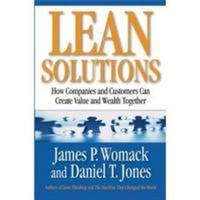Posts selected fromManagement Blog - Engineering Blog - Investing Blog and other blogs - Eliminating Complexity from Work
as much as half of the activities of about sixty people had been to set up and take down jobs, expedite, move material, count material, and do other tasks that were unnecessary in the new process.
Tim Fuller's article discusses how much inneficiency was removed from the process by adopting single piece flow in 1985. How long did it take for management practice to understand this? Certainly this understanding wasn't widespred in 2005. I am not even sure it if it is widely understood and systems have been designed or redesigned with this knowledge in 2017. continue reading: Eliminating Complexity from Work - Six Keys to Building New Markets by Unleashing Disruptive Innovation
Unfortunately we do not often stop to examine the theory and therefore fail to learn as we should as we experiment and get new results. The most effective way I know of to improve the learning is to use the PDSA cycle, predict the effects of change and then examining the results of change. As simple as those two acts are, they are skipped far to frequently.
His second point, that managers frequently use overly simplistic models or theories is also important. Management is not well suited for simple theories that can be applied in any situation. Many interdependent variables are often at play and management requires not application of simple rules but applying knowledge in complex situations as best you can. Management is challenging and simple answers are often of little value – even though they are desired. continue reading: Six Keys to Building New Markets by Unleashing Disruptive Innovation - Toyota Engineers a New Plant: the Living Kind
Toyota’s vision:
First, making things that benefit both people and the world as a whole.
…
Second, as a member of society, we must fulfill our responsibilities to all stakeholders. We must provide to customers cleaner, safer, and more attractive products with excellent value. To shareholders, we must enhance share value through long-term and stable growth by increasing profits and paying appropriate dividends. With business partners, we must engage in fair business based on a spirit of mutual benefit.
To our employees, we must provide a workplace where they can work with pride based on mutual trust and responsibility between labor and management, and respect for people.
continue reading: Toyota Engineers a New Plant: the Living Kind - Malcolm Gladwell and Synchronicity
- There is Much to Improve in How We Use the Internet to Serve Customers
Webinars can have great interaction. They can provide very useful archived webinars covering some content (live webinars could be provided for free too if the reward was worth the cost) . If the public finds that free content valuable it can be about the most effective marketing in many ways including for gaining customers for live interactive webinars on more advanced topics.
Webinars also allow the presenter to do multiple two hour sessions for different clients anywhere in the world in the same day. So you could customize your content to specific client needs. Also each of those sessions could include employees from multiple sites around the globe. continue reading: There is Much to Improve in How We Use the Internet to Serve Customers - Seven Leadership Leverage Points
IHI has the courage to say one of the 3 sources for there hypothesis as “Hunches, Intuition, and Collective Experience.” While attempting to base plans on data and not hunches is good. Often you must make decisions without data. It is why Dr. Deming was so concerned with mobility of top management: that mobility means many managers don’t really understand what they are managing. Lean thinkers understand the value of having managers with deep knowledge of the areas they manage. continue reading: Seven Leadership Leverage Points - Lean Consumption: the Customer’s Perspective
 The concepts underlying lean consumption boil down to six simple principles that correspond closely with those of lean production.
- Solve the customer’s problem completely by making sure that all the goods and services work together to do so.
- Don’t waste the customer’s (or the provider’s) time.
- Provide exactly what the customer wants.
- ...
continue reading: Lean Consumption: the Customer’s Perspective - Box on Quality
 Dr. George Box is not as well known in the general management community as his ideas merit (in my biased opinion – photo of Bill Hunter and George Box). He is well know in the statistics field as one of the leading statistical minds. Box on Quality is an excellent book that gathers his essays from his 65th to 80th year. continue reading: Box on Quality - The Quick Fix
W. Edwards Deming
One trouble with American industry today is that top management supposes that one lecture or one day will do it. “Come, spend a day with us, and do for us what you did for Japan, that we too may be saved.”
continue reading: The Quick Fix - Innovation in Organizations
- Education Improvement
Education is another area where applying management improvement concepts can be difficult. The Education area does require special care but management improvement concepts can work very well in Education.
David Langford has done some great work in this area. He wrote a book, Orchestrating Learning With Quality, which while I would definitely recommend it for anyone planning on applying these concepts... continue reading: Education Improvement - 30 Year Fixed Mortgage Rates and the Fed Funds Rate
 There is not a significant correlation between moves in federal funds rate and 30 year mortgage rates for those looking to lock in mortgage rates. For example, if 30 year rates are at 6% and the federal reserve drops the federal funds rate 50 basis points that tells you little about what the 30 year rate will do. continue reading: 30 Year Fixed Mortgage Rates and the Fed Funds Rate - Management Improvement in Healthcare
Health care (and especially M.D.s) have always been seen as among the most difficult environment to introduce new management principles (universities are another). It was surprising to me since so much of management improvement is largely about using the scientific method, but it seems to be a reality. It seems these highly educated people are used to having huge freedom to act as they wish, and seem to resist participating in a system to improve rather than doing as they wish.
To improving results in health care I strongly recommend looking at the work of the Institute for Healthcare Improvement. continue reading: Management Improvement in Healthcare - Measuring and Managing Performance in Organizations
measure [parameter] in the hopes of improving [goal]
When dysfunction occurs, the values of [parameter] go up comfortingly, but the values of [goal] get worse. Dysfunction often occurs. continue reading: Measuring and Managing Performance in Organizations - More Lean Thinking Applied in Government (2005)
Tinker Air Force Base, Oklahoma City Air Logistics Center:
the Tanker Division utilized an array of process improvement tools to facilitate improvements while increasing quality, efficiency and safety; thus enabling them to become the benchmark effort in lean implementation for Tinker Air Force Base. The results were dramatic: within four years, the average yearly flow time for a KC-135 PDM dropped 52%, the number of aircraft on station (WIP) decreased 49%, and capacity increased 75%. continue reading: More Lean Thinking Applied in Government (2005)
|